What are Frequency Meters
Frequency meters are specialized instruments used to measure the frequency of electrical signals. They are fundamental tools in various industries, including electrical maintenance, manufacturing, and engineering. These devices are essential for professionals who need to ensure that electrical systems are operating at the correct frequencies, as deviations can lead to inefficiencies, equipment damage, or unsafe conditions.
Frequency meters operate on the principle of counting the number of cycles of an electrical signal within a set time period. This count is then used to calculate the frequency of the signal, typically displayed in hertz (Hz). Some meters also provide additional measurements such as voltage and current, making them versatile tools for comprehensive electrical analysis.
The users of frequency meters range from electricians troubleshooting power systems to engineers designing electronic devices. These meters ensure that all components within a system are synchronized and functioning at their optimal frequencies. Without these critical measurements, there would be a higher risk of malfunction or failure in electrical systems, leading to potential safety hazards.
Types of Frequency Meters
In the realm of frequency measurement, various types of meters are available to suit different applications:
Digital Frequency Meters: These meters feature digital displays and provide high accuracy and resolution. They are commonly used in modern industrial and commercial applications where precise measurements are critical.
Analog Frequency Meters: Analog meters use a needle and dial to indicate frequency. They might not offer the same level of precision as digital meters but are valued for their simplicity and durability in environments where digital technology might fail.
Handheld Frequency Meters: Portable and battery-operated, these meters are ideal for field service technicians who need to measure frequencies on-site in various locations.
Benchtop Frequency Meters: Designed for laboratory or workshop settings, benchtop meters often have enhanced features and higher precision. They’re suitable for applications requiring detailed analysis and long-term monitoring.
Panel Mount Frequency Meters: These are installed directly into control panels or equipment racks and provide constant monitoring of system frequencies in industrial settings.
How to choose Frequency Meters
Choosing the right frequency meter requires careful consideration of several factors:
Accuracy and Resolution: Depending on the criticality of the measurements, select a meter with suitable accuracy and resolution to ensure reliable data.
Display Type: Digital displays provide ease of reading and may offer more features than analog displays, which may be preferred for their simplicity and fast response time.
Measurement Range: The frequency range capability of the meter should cover the frequencies of the systems you intend to measure.
Portability: If measurements need to be taken across various locations or in tight spaces, a handheld meter might be more practical than a benchtop model.
Durability: For environments that are harsh or have a high likelihood of physical impacts, it is important to choose a robust meter possibly with protective casing or rugged design.
Additional Features: Some frequency meters come with extra functionalities like data logging, connectivity options for data transfer, or multiple measurement capabilities (such as voltage and current).
Best Frequency Meters on Alibaba.com
Alibaba.com stands out as a leading marketplace for sourcing frequency meters for businesses worldwide. With an extensive selection from various suppliers, Alibaba.com caters to all types of industries looking for quality electrical instruments. The platform's user-friendly interface allows easy comparison across different models and specifications, ensuring that businesses can find the right tools tailored to their unique needs.
The ability to connect with suppliers directly on Alibaba.com greatly facilitates customization requests. Whether it's ODM services for bespoke designs or software reengineering for specific applications, businesses have flexibility at their fingertips. Moreover, with suppliers offering products designed for a broad spectrum of applications – from machinery repair shops to construction sites – the diversity available is unparalleled.
Alibaba.com's commitment to safeguarding transactions through services like Trade Assurance instills confidence in buyers, assuring them that their orders will be protected until delivery is completed. This emphasis on creating an efficient and secure trading environment echoes Alibaba Group's vision – making it easy to do business anywhere. By leveraging Alibaba.com's platform, businesses can not only procure high-quality frequency meters but also gain an edge in operational efficiency and innovation.
Common FAQs for Frequency Meters
What is a frequency meter and what does it measure?
A frequency meter is an instrument designed to measure the frequency of an electrical signal, represented in cycles per second or hertz (Hz). It is essential for ensuring that electrical systems operate at their intended frequencies.
How does a digital frequency meter differ from an analog one?
Digital frequency meters display readings on a digital screen and generally offer higher accuracy and features such as data logging. Analog meters use a needle and dial to show frequency and are appreciated for their simplicity and fast response.
Can frequency meters measure parameters other than frequency?
Some frequency meters are multifunctional and can measure additional electrical parameters such as voltage, current, and sometimes even power, depending on the model.
What should I consider when choosing a frequency meter for industrial use?
For industrial use, consider the meter's accuracy, durability, frequency range, additional features like data logging or connectivity, and whether it fits within control panels or equipment racks for constant monitoring.
Are there portable options available for frequency meters?
Yes, handheld frequency meters are available for field technicians who require portability to measure frequencies in various locations or situations where benchtop meters are not feasible.
What kind of additional features might a frequency meter have?
Additional features can include data logging capabilities, connectivity options for data transfer (like USB or Bluetooth), multiple measurement capabilities, as well as customizable software or design through ODM services.
How do I ensure the accuracy of the frequency meter readings?
Ensure accuracy by regularly calibrating the meter according to the manufacturer’s guidelines and choosing a meter with a suitable accuracy rating for your specific application.
Is it possible to get a custom-designed frequency meter for specific applications?
Yes, through Alibaba.com, businesses can request ODM services from suppliers for custom-designed frequency meters tailored to their specific application needs.
What types of businesses commonly use frequency meters?
Businesses across various industries such as electrical maintenance, manufacturing plants, construction sites, machinery repair shops, and energy management sectors commonly use frequency meters.
How does phase type affect my choice of a frequency meter?
The phase type (single phase or 3 phase) determines which frequency meter is appropriate based on the electrical system it will be used with. It's important to match the meter to the phase type of your system.







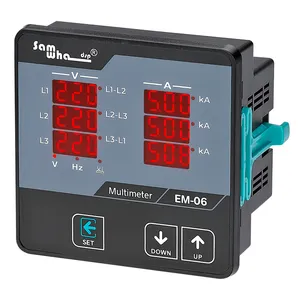




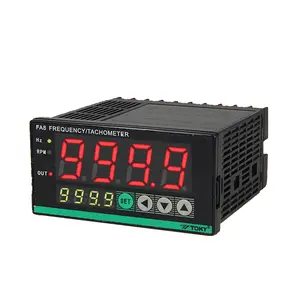
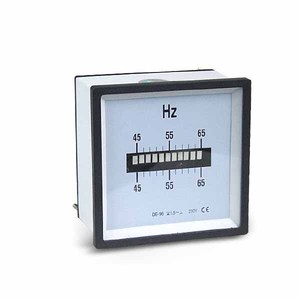
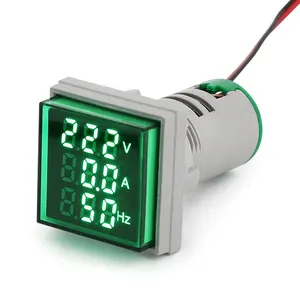

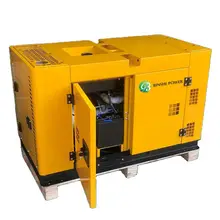



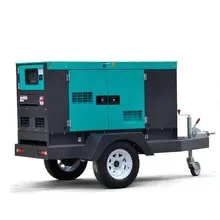























 浙公网安备 33010002000092号
浙公网安备 33010002000092号 浙B2-20120091-4
浙B2-20120091-4